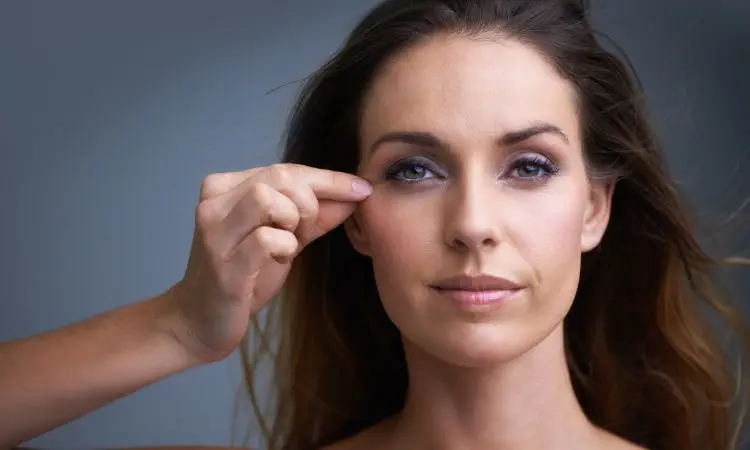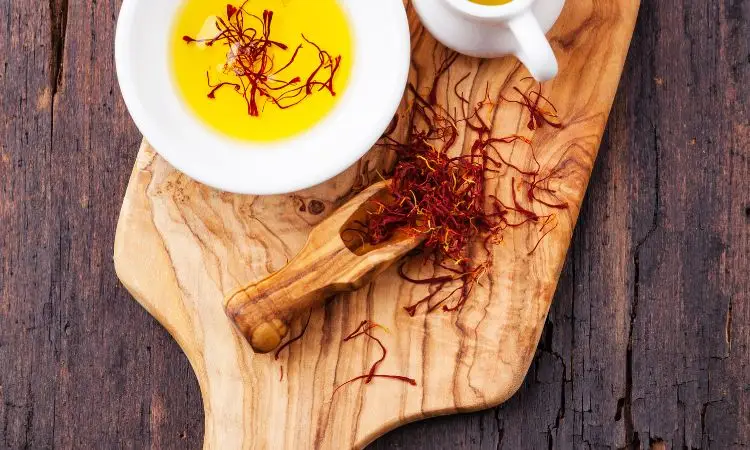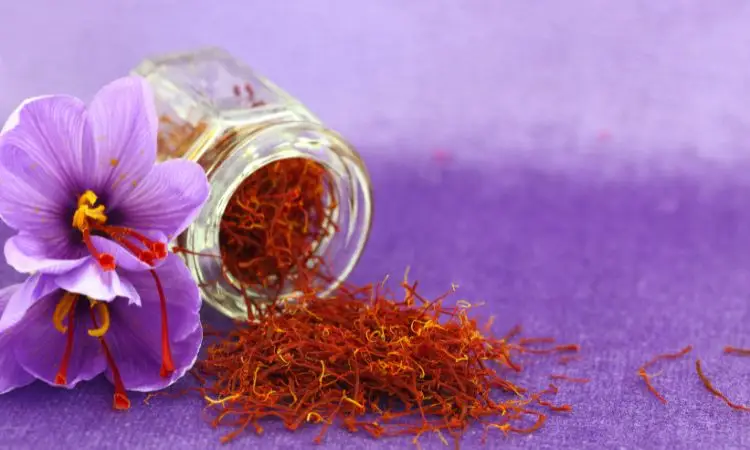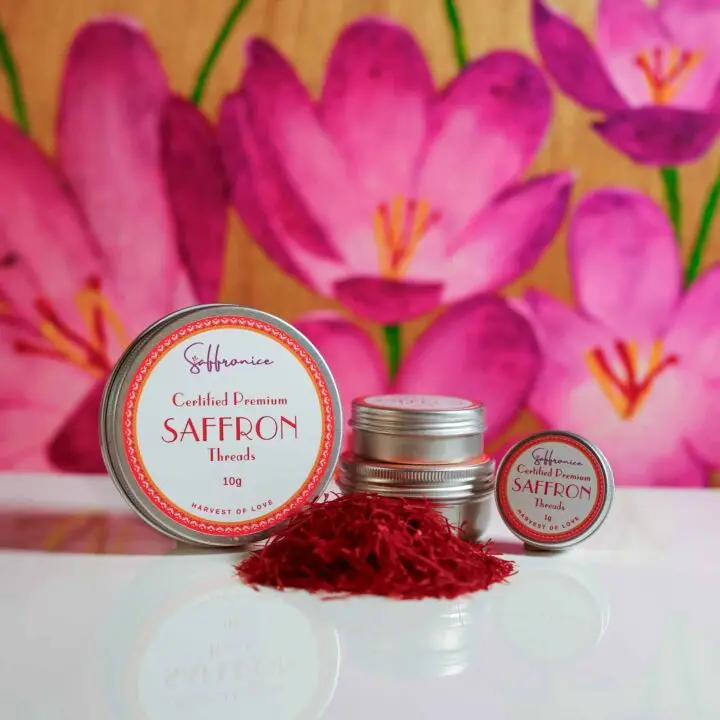📌 Quick Answer: Saffron contains powerful anti-aging compounds—crocin, crocetin, and safranal—that protect against free radical damage, boost collagen production, reduce wrinkles, enhance skin elasticity, improve hydration, and provide anti-inflammatory benefits. Clinical studies show significant improvements in skin texture, firmness, and radiance with consistent use.
Can an ancient spice like saffron make your skin look young and radiant? Understanding what saffron is reveals why this vibrant, ruby-hued ingredient from the Crocus sativus flower contains concentrated antioxidants and bioactive compounds that effectively fight visible signs of aging.
From reducing fine lines and wrinkles to improving skin texture and boosting natural radiance, saffron has emerged as a rising star in natural anti-aging skincare, backed by both ancient wisdom and modern scientific research.
Chef’s Professional Tip: In professional kitchens, we extract saffron’s compounds using gentle heat in liquids. This same extraction principle applies to skincare—proper preparation releases saffron’s anti-aging compounds for maximum therapeutic effectiveness.
Food Scientist’s Note: Saffron’s anti-aging efficacy stems from its unique bioactive profile containing crocin (antioxidant protection), crocetin (collagen synthesis), and safranal (anti-inflammatory effects), working synergistically to combat multiple aging mechanisms.

Ancient Legacy of Saffron in Beauty Traditions
Saffron’s role in ancient medicine and beauty rituals demonstrates its prestigious reputation spanning thousands of years. The history and origins of saffron reveal how this prized ingredient was treasured for its luxurious and skin-enhancing qualities across multiple civilizations.
From Cleopatra’s Legendary Baths to Modern Skincare
Cleopatra, Egypt’s iconic queen, famously incorporated saffron into her elaborate bathing rituals, using it to maintain her legendary, youthful, radiant complexion. Ancient civilizations across the Mediterranean recognized saffron’s remarkable skin benefits, incorporating it into countless beauty formulations.
Traditional Applications Across Civilizations
Ancient Greece and Rome valued saffron for brightening skin and reducing blemish appearance, incorporating it into daily beauty practices.
Persian Medicine: Saffron in Ayurveda and Persian traditions was utilized as a spice for its soothing and anti-inflammatory effects, making it essential in skincare remedies.
Ancient India: Ayurvedic practitioners employed saffron to balance skin tone, reduce pigmentation, and impart a radiant glow, establishing protocols still referenced today.
Saffron’s extensive history in skincare demonstrates how ancient cultures intuitively recognized its benefits. Modern science now confirms these traditional applications, establishing saffron as a validated premium skincare ingredient.
Understanding Saffron’s Bioactive Composition
Saffron’s remarkable anti-aging benefits derive from its unique compounds—crocin, crocetin, and safranal. Saffron’s antioxidant properties stem from these powerful antioxidants that combat free radicals responsible for premature aging and skin damage.
Key Compound Functions
Crocin: The red pigment providing saffron’s distinctive color also delivers potent antioxidant effects, protecting cellular health while brightening skin and promoting youthful appearance.
Crocetin: Enhances skin firmness and suppleness through improved cellular function, contributing to visibly rejuvenated complexions.
Safranal: Provides powerful antioxidant protection against environmental pollution while maintaining overall skin health and resilience.
This synergistic combination of compounds establishes saffron as a premier choice for natural anti-aging skincare, helping achieve youthful, glowing complexions through multiple beneficial mechanisms.
Scientific Foundation of Anti-Aging Benefits
Extensive research validates saffron’s remarkable anti-aging effects. As the world’s most expensive spice, saffron justifies its premium status through scientifically proven compounds that fight free radicals and protect cellular integrity.
Bioactive Compounds in Action
Primary saffron skin benefits originate from carotenoids like crocin and crocetin, which possess potent antioxidant and anti-inflammatory capabilities. These compounds reduce aging signs, improve skin texture, and enhance brightness through multiple complementary pathways.
Clinical Research Validation
Science-backed saffron benefits include studies published in the Journal of Cosmetic Dermatology demonstrating that users of saffron products experienced significant improvements in skin texture, firmness, and overall radiance compared to baseline measurements.
Free Radical Protection Mechanisms
Saffron’s antioxidants—particularly crocin and safranal—actively combat harmful free radicals that cause premature aging, sun damage, and various skin issues. By neutralizing oxidative stress, saffron maintains skin resilience and youthful appearance while promoting healthy, radiant complexions.
The spice’s anti-inflammatory effects further support skin rejuvenation, helping reduce fine lines and wrinkles through comprehensive cellular protection.
Cellular-Level Anti-Aging Mechanisms
As we age, skin cells face constant challenges from environmental stressors and natural aging processes. Saffron, known as “red gold,” provides powerful cellular support through its unique bioactive compounds.
Antioxidant Protection at the Cellular Level
Saffron’s antioxidants—safranal, crocin, and crocetin—neutralize free radicals, protecting skin cells from oxidative damage. This cellular protection maintains healthy, youthful skin appearance by preventing cumulative damage that manifests as visible aging.
Collagen Production Stimulation
Saffron stimulates collagen production, the protein responsible for skin firmness and elasticity. As natural collagen levels decline with age, causing wrinkles and sagging, saffron helps maintain optimal collagen synthesis, keeping skin plump, supple, and resistant to aging signs.
| Saffron Compound | Primary Cellular Benefits |
|---|---|
| Safranal | Antioxidant protection from oxidative damage |
| Crocin | Collagen stimulation, cell regeneration |
| Crocetin | Anti-inflammatory, free radical neutralization |
Collagen Enhancement and Skin Elasticity
Saffron’s reputation as the “golden spice of the East” extends beyond aroma and color to significant anti-aging benefits through collagen support.
Promoting Natural Collagen Synthesis
Saffron compounds, particularly crocin and crocetin, function as powerful antioxidants that stimulate collagen production. Collagen maintains the skin’s youthful elasticity and firmness. By supporting natural collagen renewal, saffron reduces wrinkle appearance, creating younger-looking, more vibrant complexions.
Maintaining Skin Structure and Firmness
Beyond collagen production, saffron enhances overall skin elasticity and firmness. Its bioactive compounds strengthen the skin’s structural integrity, helping it withstand environmental stressors while maintaining a youthful appearance longer. Regular saffron application provides cumulative benefits for skin resilience and appearance.
Antioxidant Protection Against Environmental Damage
Saffron’s concentrated antioxidants provide powerful protection against harmful free radicals that accelerate skin aging. Saffron’s anti-inflammatory properties complement its antioxidant effects, creating comprehensive skin defense.
Comprehensive Environmental Defense
Incorporating saffron into skincare shields skin from pollution and UV radiation damage, promoting healthier, more resilient complexions. Saffron’s vitamin C content fights sun damage while reducing redness and acne through anti-inflammatory action.
Pigmentation and Damage Repair
Saffron carotenoids—crocin and crocetin—support skin damage repair while reducing dark spots and hyperpigmentation. This dual action creates brighter, more even-toned complexions that appear naturally youthful.
| Antioxidant Component | Protective Benefits |
|---|---|
| Crocin | UV protection, free radical neutralization, color correction |
| Safranal | Collagenase inhibition, collagen synthesis, and elasticity maintenance |
| Vitamin C | Sun damage defense, healing support, and inflammation reduction |
Hydration and Moisture Retention Enhancement
Saffron transcends its culinary reputation to become a skincare superstar, particularly for enhancing hydration and moisture retention.
Deep Hydration Mechanisms
Saffron compounds—crocin and crocetin—provide profound hydration benefits. Antioxidants protect against free radical damage while saffron stimulates collagen production, creating stronger, more hydrated skin with improved moisture retention capacity.
Moisture Barrier Strengthening
Beyond hydration, saffron fortifies the skin’s moisture barrier through anti-inflammatory effects that calm irritated skin. This barrier enhancement helps skin retain moisture effectively, maintaining a dewy, supple appearance that characterizes healthy, youthful complexions.
Natural Anti-Inflammatory Benefits
Aging skin increasingly experiences inflammation, redness, and irritation. Saffron provides natural solutions through potent anti-inflammatory properties.
Inflammation Reduction at Source
Research demonstrates saffron’s ability to reduce skin redness, swelling, and irritation. Compounds like crocin and crocetin combat inflammation at cellular levels, producing smoother, brighter complexions. Saffron addresses the root causes of skin aging, including fine lines and wrinkles triggered by chronic inflammation.
Sensitive Skin Applications
Saffron particularly benefits sensitive skin prone to chronic inflammatory conditions. Incorporating saffron into skincare routines balances overall skin health, offering gentle yet powerful approaches to combating aging signs through inflammation management.
Practical Integration into Anti-Aging Routines
Saffron for glowing skin applications spans over 3,000 years of beauty traditions. This golden spice now dominates modern natural skincare for fighting aging signs effectively.
DIY Saffron Beauty Treatments
Creating effective saffron face masks provides accessible luxury:
Brightening Mask: Combine 50-100mg saffron with creamy milk and honey for a hydrating, pigmentation-reducing treatment.
Refreshing Toner: Mix saffron with rose water overnight for pore-tightening, radiance-boosting applications.
Selecting Premium Saffron Products
Comprehensive saffron skincare benefits require quality ingredients. Choose products that list Crocus sativus prominently in ingredient lists. Quality saffron products display a bright golden color with sweet, earthy aromas. Premium pricing reflects saffron’s labor-intensive harvesting process.
Consistency remains crucial—regular application yields the best visible results over time.
Quality Sourcing and Safety Considerations
Knowing where to buy authentic saffron ensures optimal anti-aging results. Understanding real versus fake saffron protects investments and guarantees therapeutic effectiveness.
Safety Guidelines and Dosing
Understanding potential side effects ensures safe usage. While generally safe, proper application matters. Recommended topical doses of 25-30mg provide benefits without risks. Always perform patch testing before full facial application, especially for sensitive skin.
Common Myths Addressed
Myth: Saffron causes harmful side effects. Fact: Research confirms safety when used correctly at appropriate doses
Myth: Saffron is ineffective for skincare. Fact: Centuries of traditional use plus modern clinical validation confirm significant benefits
Myth: All saffron products are usually effective. Fact: Quality varies significantly—premium products justify higher costs through superior potency
Integration with Natural Beauty
Saffron and natural beauty principles emphasize holistic approaches combining ancient wisdom with scientific validation for comprehensive anti-aging benefits.
Conclusion: Embracing Saffron for Timeless Beauty
Saffron represents a powerful natural anti-aging ingredient validated by both rich historical legacy and contemporary scientific research. Its comprehensive benefits—from collagen stimulation to free radical protection—address multiple aging mechanisms simultaneously.
The clean beauty industry increasingly recognizes saffron’s importance as demand grows for natural, effective skincare solutions. Research consistently demonstrates saffron’s remarkable protective properties through compounds like crocin and crocetin, which function as potent antioxidants defending against environmental damage and aging acceleration.
Key Takeaways:
- Powerful bioactive compounds provide multi-mechanism anti-aging protection
- Collagen stimulation maintains firmness and reduces wrinkles
- Antioxidant defense protects against free radicals and environmental damage
- Anti-inflammatory properties soothe aging skin concerns
- Clinical studies validate traditional uses with measurable results
Whether through DIY treatments or premium commercial formulations, saffron offers scientifically validated pathways to youthful, radiant complexions. Consistent application combined with quality sourcing maximizes this ancient spice’s remarkable potential for achieving timeless beauty and maintaining healthy, vibrant skin throughout life.




